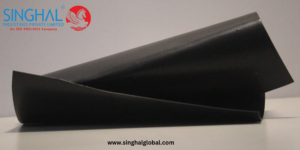In today’s world, where environmental protection and resource management are paramount concerns, the use of geomembrane sheets has emerged as a crucial solution. Geomembrane exporters in India, made from various materials such as high-density polyethylene (HDPE), low-density polyethylene (LDPE), polyvinyl chloride (PVC), and ethylene propylene diene monomer (EPDM), offer versatile applications across different industries.
1. Introduction to Geomembrane Sheet
Geomembrane sheets are impermeable membranes used in geotechnical engineering to control fluid or gas migration in a human-made project, structure, or system. These sheets are manufactured to withstand harsh environmental conditions, making them ideal for applications where containment, protection, or isolation is required.
2. Types of Geomembrane Sheets
High-Density Polyethylene (HDPE)
HDPE geomembranes are known for their high tensile strength, chemical resistance, and durability. They are commonly used in applications such as landfill liners, pond liners, and mining operations.
Low-Density Polyethylene (LDPE)
LDPE geomembranes are flexible and are often used in applications that require conformability to irregular surfaces. They are suitable for applications such as secondary containment and floating covers.
Polyvinyl Chloride (PVC)
PVC geomembranes offer excellent chemical resistance and are widely used in applications such as wastewater treatment, canal lining, and agricultural pond liners.
Ethylene Propylene Diene Monomer (EPDM)
EPDM geomembranes are highly flexible and UV resistant, making them suitable for applications such as decorative pond liners, roofing membranes, and irrigation canal liners.
3. Applications of Geomembrane Sheets
Geomembrane sheets find extensive applications across various industries due to their versatility and effectiveness in containment and protection. Some common applications include:
Environmental Protection
Geomembranes are used in environmental protection projects such as landfill liners, hazardous waste containment, and groundwater protection.
Waste Containment
Geomembranes play a crucial role in waste containment applications, including landfill liners, leachate ponds, and capping systems.
Water Management
Geomembranes are utilized in water management projects such as canal lining, reservoir lining, and wastewater treatment facilities.
4. Factors to Consider When Choosing Geomembrane Manufacturers
When selecting Geotextiles and geomembranes manufacturers in India, several factors need to be considered to ensure the quality and reliability of the product:
Quality Standards
Choose manufacturers that adhere to industry standards and certifications to guarantee the quality and performance of the geomembrane sheets.
Experience and Expertise
Look for manufacturers with extensive experience and expertise in geomembrane manufacturing and installation to ensure optimal results.
Customization Options
Opt for manufacturers that offer customization options to meet specific project requirements and ensure a tailored solution.
Pricing and Budget
Consider the pricing and budget constraints when choosing geomembrane manufacturers, ensuring cost-effectiveness without compromising quality.
5. Advantages of Using Geomembrane Sheets
Geomembrane sheets offer numerous advantages, making them a preferred choice for various applications:
Durability
Geomembrane sheets are highly durable and resistant to punctures, tears, and chemical degradation, ensuring long-term performance and reliability.
Flexibility
Geomembranes are flexible and adaptable to different site conditions, allowing for easy installation and conformability to irregular surfaces.
Environmental Protection
Geomembranes provide effective containment and protection against environmental hazards, safeguarding soil, water, and ecosystems from contamination.
6. Challenges and Limitations
Despite their numerous benefits, geomembrane sheets also present some challenges and limitations:
Installation Complexity
The installation of geomembranes can be complex and requires skilled labor and specialized equipment to ensure proper placement and sealing.
Maintenance Requirements
Geomembranes may require regular inspection and maintenance to detect and address any issues such as damage or deterioration over time.
7. Future Trends in Geomembrane Technology
The future of geomembrane technology holds exciting prospects with advancements in materials and installation techniques:
Innovative Materials
Research and development efforts are focused on developing innovative geomembrane materials with enhanced properties such as self-healing and improved durability.
Advanced Installation Techniques
Advancements in installation techniques, such as robotic welding and automated quality control systems, are poised to improve the efficiency and reliability of Geomembrane sheet manufacturers in India.
8. Conclusion
Geomembrane sheets play a vital role in modern engineering and environmental protection efforts, offering versatile solutions for containment, protection, and isolation. By considering factors such as material selection, manufacturer expertise, and future trends, stakeholders can make informed decisions to optimize the use of geomembranes in various applications.
FAQs
What is a geomembrane sheet?
A geomembrane sheet is an impermeable membrane used in geotechnical engineering to control fluid or gas migration in various projects or structures.
What are the common applications of geomembrane sheets?
Geomembrane sheets are commonly used in applications such as landfill liners, pond liners, wastewater treatment facilities, and environmental protection projects.
How do I choose the right geomembrane manufacturer?
When selecting a geomembrane manufacturer, consider factors such as quality standards, experience, customization options, and pricing to ensure the best fit for your project requirements.
What are the advantages of using geomembrane sheets?
Geomembrane sheets offer advantages such as durability, flexibility, and environmental protection, making them suitable for a wide range of applications.

